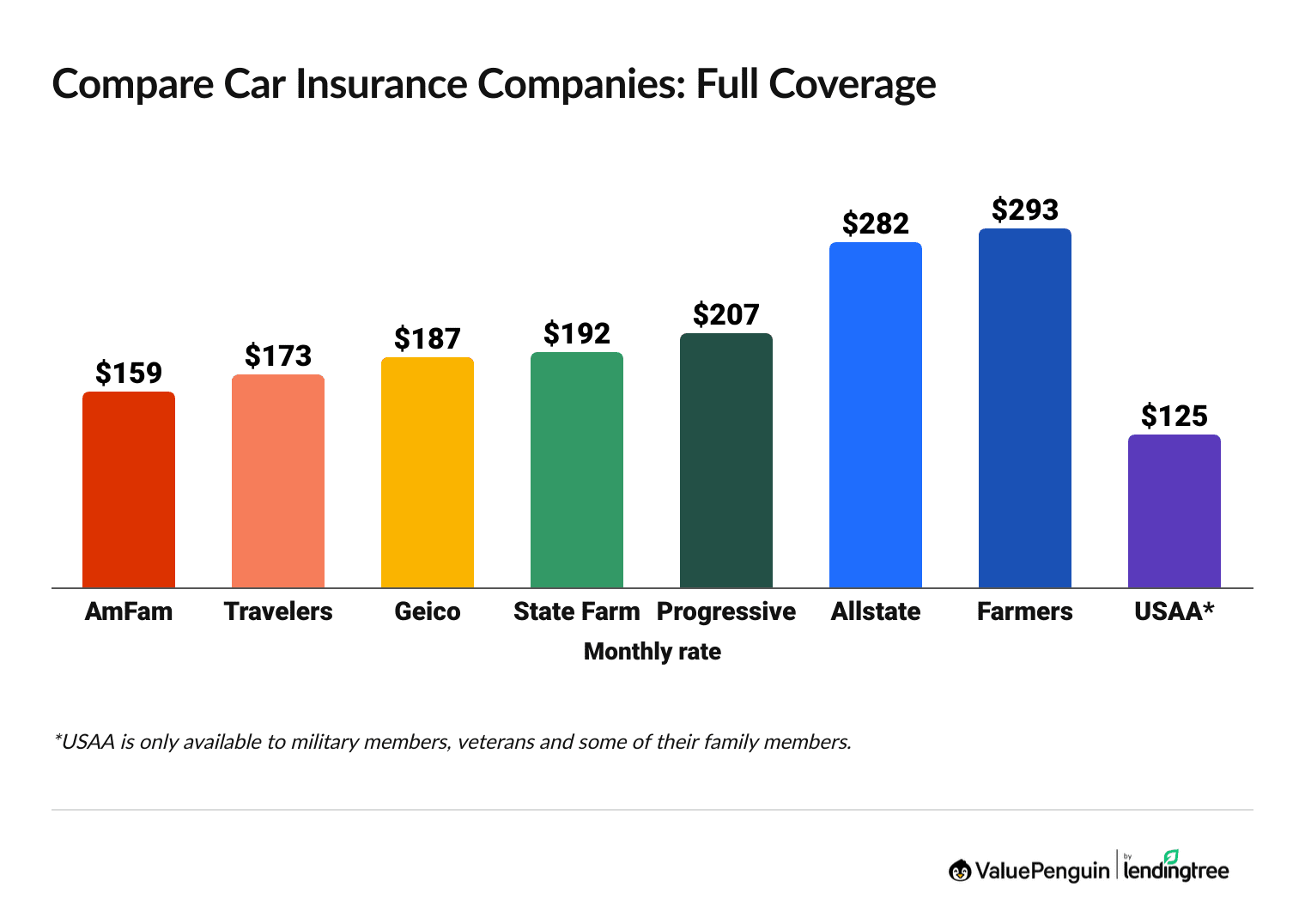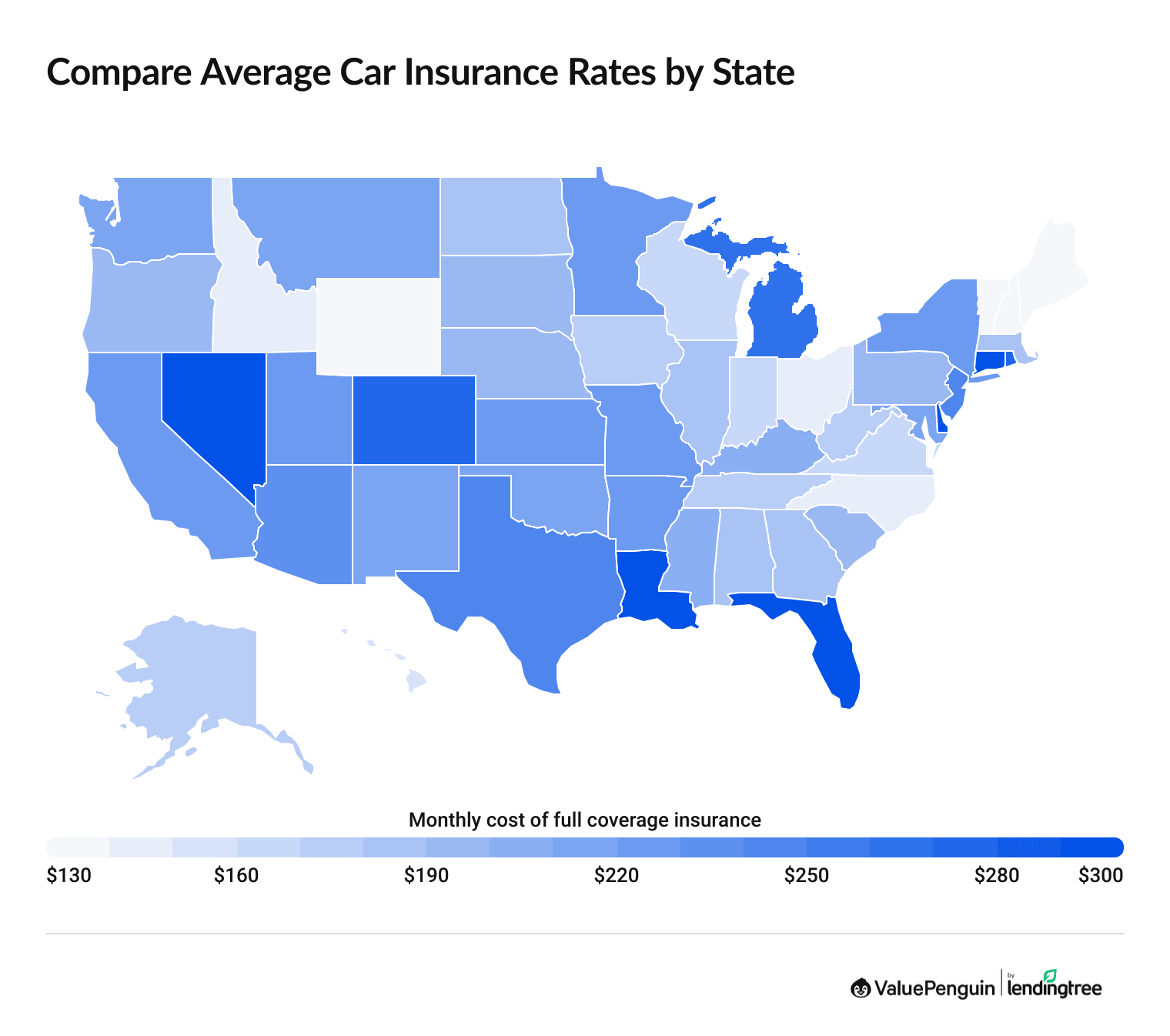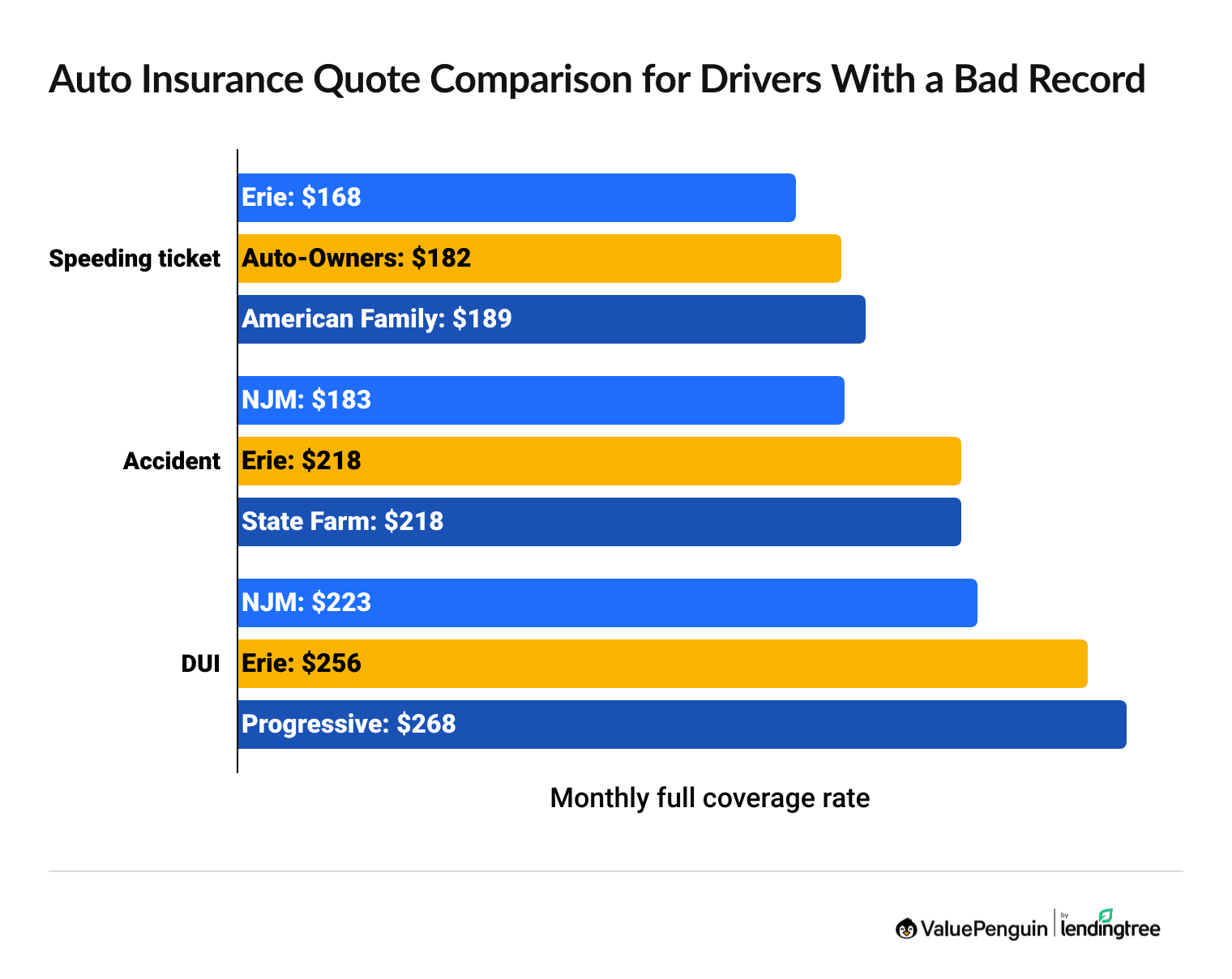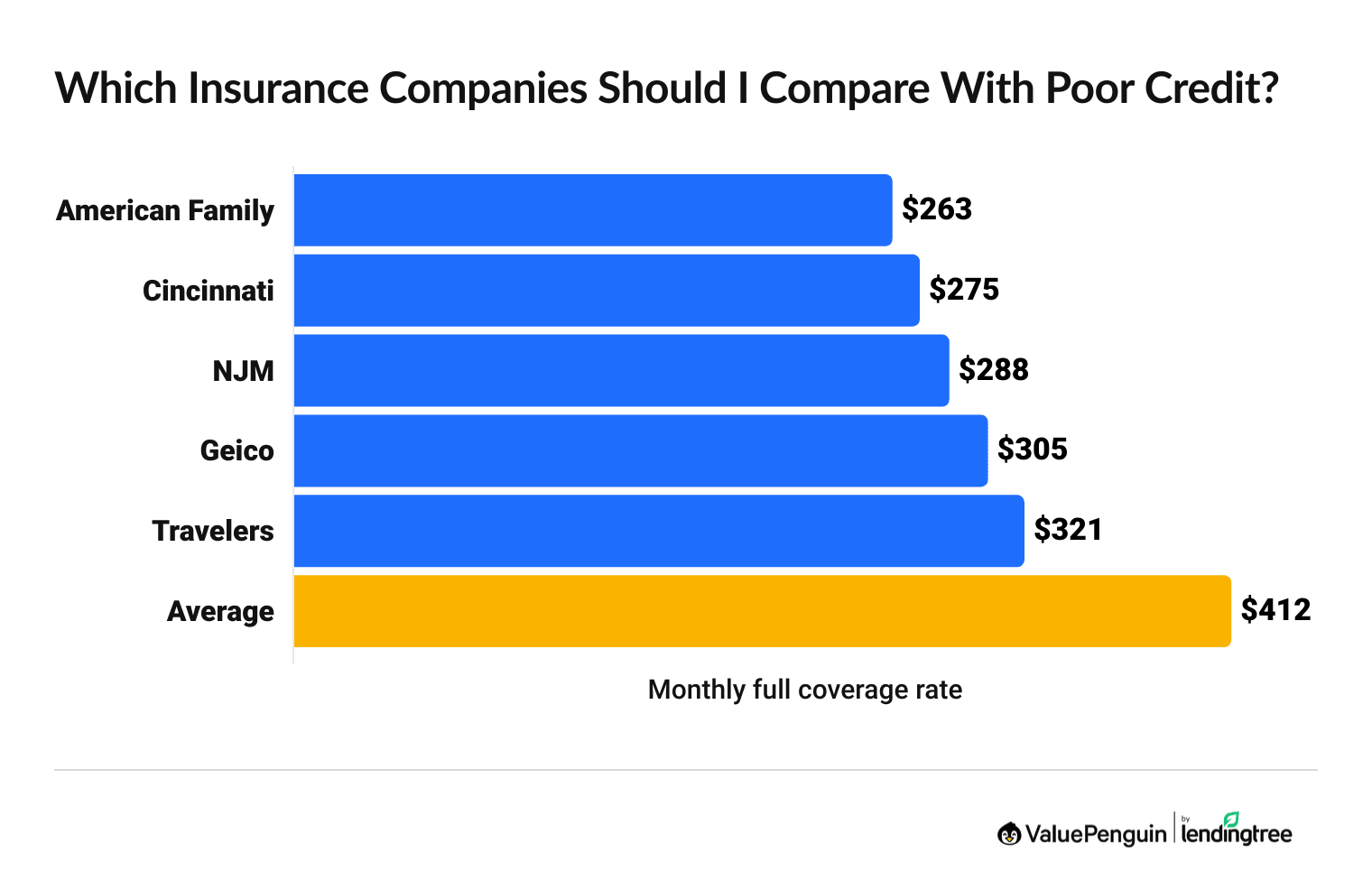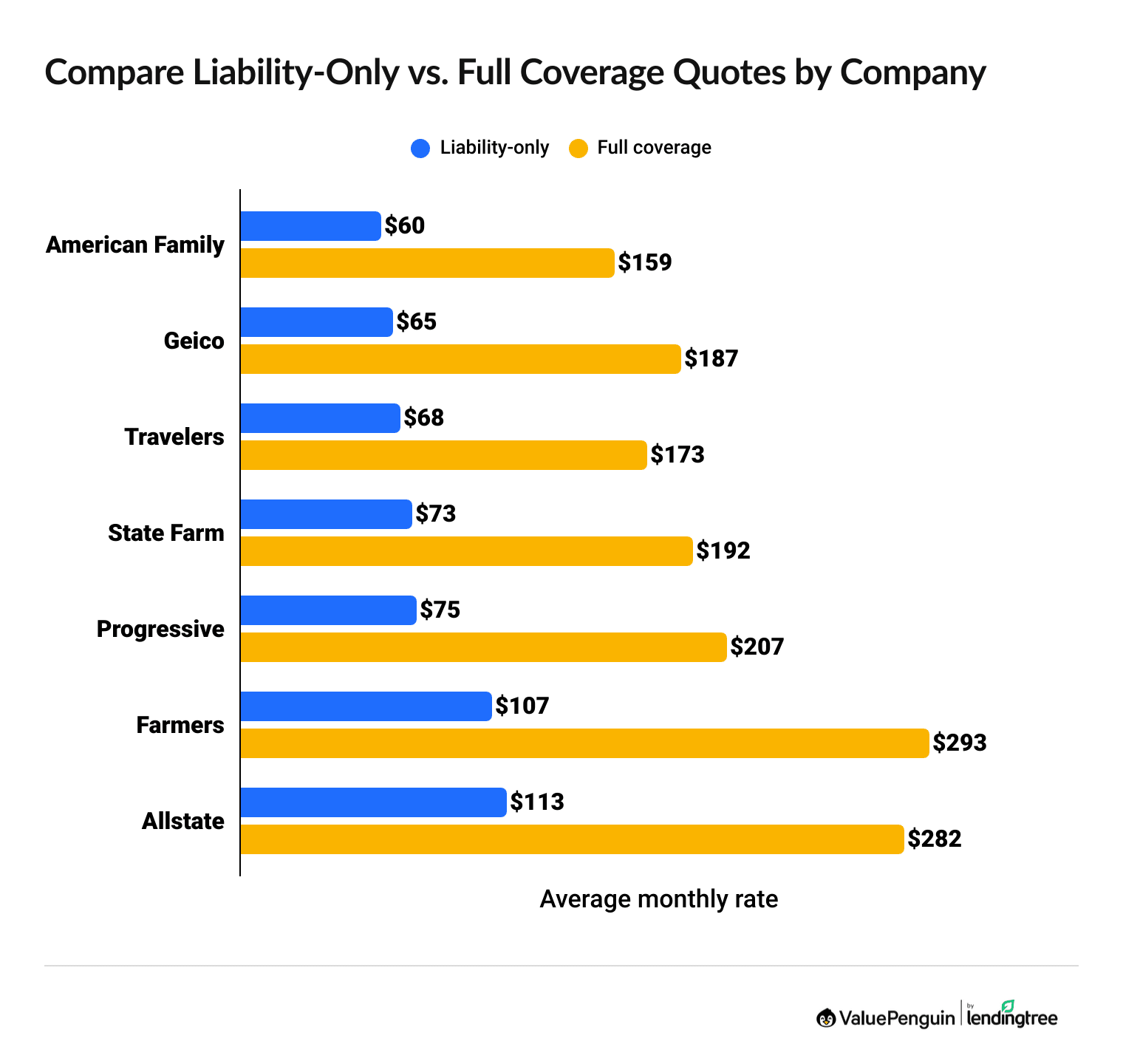Compare 2026 Car Insurance Rates
You could save around $134 per month on full coverage insurance and $53 per month on liability-only insurance by comparing quotes.
Find Cheap Auto Insurance Quotes in Your Area
Compare car insurance rates
American Family (AmFam), Travelers and USAA are three major companies most drivers should compare for full coverage insurance.
However, car insurance prices differ depending on where you live, your driving history and more. So it's a good idea to compare quotes from more than three companies.
Find Cheap Auto Insurance Quotes in Your Area
Compare full coverage car insurance rates by company
Company | Monthly rate | |
|---|---|---|
| American Family | $159 | |
| Travelers | $173 | |
| Geico | $187 | |
| State Farm | $192 | |
| Progressive | $207 | |
*USAA is only available to members of the military, veterans and their families.
Compare insurance companies
When shopping for car insurance, you shouldn't just compare prices. It's also important to consider a company's customer service reviews, along with its available discounts and coverage add-ons.

What affects your car insurance rates?
Car insurance comparison by state
Average full coverage car insurance rates vary by up to $207 per month, depending on which state you live in.
This is in part because of state laws. Each state can decide how much car insurance coverage its drivers need. Most insurance companies must also have their rates approved by state officials before they can make changes.
Rates also vary based on factors like population density, crime rates and severe weather patterns.
Comparing auto insurance rates by state is the easiest way to find the best car insurance prices near you.
Which companies should I compare rates from in my state?
State | Avg. cost | Cheapest companies |
|---|---|---|
| Alabama | $181 | Travelers: $134 Country Financial: $138 Auto-Owners: $144 |
| Alaska | $170 | Geico: $129 Progressive: $165 State Farm: $179 |
Rates are for a full coverage policy with collision and comprehensive coverage paid monthly.
Car insurance price comparison by age
Full coverage car insurance for 18-year-old drivers is nearly three times more expensive than coverage for 30-year-old drivers.
Age is a major factor when comparing car insurance rates. Younger drivers pay more for auto insurance than older drivers. That's because insurance companies consider them more likely to get in an accident.
Which companies should I compare rates from at my age?
Age | Average cost | Cheapest companies |
|---|---|---|
| 16 | $792 | State Farm: $484/mo Geico: $613/mo Travelers: $621/mo |
| 17 | $687 | State Farm: $431/mo Travelers: $496/mo Geico: $525/mo |
Find Cheap Auto Insurance Quotes in Your Area
Compare insurance by driving history
Midsize companies like Erie, NJM and Auto-Owners are typically the best companies to compare after a speeding ticket, an accident or a DUI.
However, coverage from these companies isn't available in every state. American Family, State Farm and Progressive are the best major companies to compare if you have a bad driving record.
Which companies should I compare after a ticket, an accident or a DUI?
Incident | Avg. cost | Cheapest companies | |
|---|---|---|---|
| Speeding | $258 | Erie: $168 Auto-Owners: $182 American Family: $189 | |
| Accident | $310 | NJM: $183 Erie: $218 State Farm: $218 | |
| DUI | $391 | NJM: $223 Erie: $256 Progressive: $268 | |
Rates are for a full coverage policy with collision and comprehensive coverage paid monthly.
Comparing car insurance for people with poor credit
American Family, Cincinnati and NJM are the best companies to compare car insurance rates from if you have a poor credit score.
Drivers with good or excellent credit scores tend to pay lower car insurance rates. Those with poor or bad credit scores pay nearly twice as much for full coverage car insurance.
Find Cheap Auto Insurance Quotes in Your Area
Which companies should I compare with a bad credit score?
Company | Monthly rate | |
|---|---|---|
| American Family | $263 | |
| Cincinnati | $275 | |
| NJM | $288 |
In most states, credit scores help set your auto insurance rates.
Insurance companies use a calculation called a credit-based insurance score to give each customer a rating. Your score doesn't have anything to do with your driving habits. But companies believe people with lower credit scores are more likely to file claims.
California, Hawaii, Massachusetts and Michigan don't allow insurance companies to use your credit score to help set your car insurance rates. In these states, your credit score won't affect your car insurance rates.
Compare car insurance quotes by coverage type
Full coverage insurance costs an average of $132 per month more than a liability-only policy.
The type of coverage you choose has a big impact on how much you'll pay for car insurance because it affects how much your insurance company will pay you after a crash.
But the difference between full and liability-only rates can vary widely depending on which company you choose. For example, American Family charges $99 per month more for full coverage insurance than a liability-only policy. But Farmers charges an extra $186 per month — that's more than double its liability-only rate.
Compare monthly car insurance rates by coverage type
Company | Liability-only | Full coverage | Difference |
|---|---|---|---|
| American Family | $60 | $159 | $99 |
| Geico | $65 | $187 | $122 |
| Travelers | $68 | $173 | $105 |
| State Farm | $73 | $192 | $119 |
| Progressive | $75 | $207 | $132 |
*USAA is only available to military members, veterans and some of their family members.
Company | Liability-only | Full coverage |
|---|---|---|
| American Family | $60 | $159 |
| Geico | $65 | $187 |
| Travelers | $68 | $173 |
| State Farm | $73 | $192 |
| Progressive | $75 | $207 |
*USAA is only available to military members, veterans and some of their family members.
Where you live can also have an impact on the difference in cost between full and liability-only coverage. For example, full coverage insurance in New Hampshire only costs $79 per month more than liability-only insurance. But drivers in Louisiana pay $226 per month more for full coverage.
How to compare car insurance rates
To compare car insurance rates, you need to decide how much coverage you need and shop around for quotes. Then, you should compare the cheapest companies to find one that offers the coverage you need and great customer service at a price you can afford.
Decide how much coverage you need
The amount of coverage you choose is important when comparing car insurance because it has a big impact on your rates.
In addition, not all companies offer the same coverage options. So if you're looking for extra protection like new car replacement or gap insurance, that could limit the companies you consider.
Compare car insurance coverage basics
When comparing car insurance rates, select the same coverage limits from each company for an apples-to-apples comparison.
Most states require you to have a minimum amount of coverage. However, it's usually a good idea to get a full coverage policy.
Most lenders require full coverage with collision and comprehensive coverage if you have a loan or lease. It's also a good idea if your car is less than eight years old or worth more than $5,000.
When deciding on liability coverage limits, start with the current coverage you have. You can find your current coverage online or on your policy declaration page. This page is part of the paperwork you get when you buy a new policy. It outlines the types of coverage and limits you have.
Collision and comprehensive insurance don't have limits, so make sure you select the same deductibles.
Every insurance company should offer the same basic car insurance coverages.
Most states require you to have bodily injury and property damage liability coverages, which pay for damage and injuries you cause in an accident. Some states require uninsured and underinsured motorist coverage, personal injury protection or medical payments coverage.
States never require comprehensive and collision coverage. However, your lender typically requires these coverages if you have a car loan or lease.
Most companies offer extra coverage for a few dollars per month. But you often need to have full coverage first. Popular coverage add-ons include:
Collect and compare insurance quotes
The fastest way to shop around for multiple quotes is to use an online car insurance comparison tool.
These tools allow you to get quotes from many companies fairly quickly.
Find Cheap Auto Insurance Quotes in Your Area
You can also visit insurance company websites and use their online quote tools to compare auto insurance rates. In addition, you can call an agent at the insurance company or work with an independent agent, who can help you compare multiple rates at once.
Car insurance prices change over time. When collecting rates, save the reference number so you can get back to the quote later. Also, rates may expire after a few weeks. If you find a good price, you might have to buy coverage sooner to get that rate.
Start by getting quotes from the cheapest companies or the best companies near you.
Online auto insurance comparison tools and insurance agents can provide you with estimates. But the rates you get will only be as accurate as the info you provide.
For example, if you forget to tell the insurance company about a speeding ticket you got two years ago, your quote may be lower than the price you'll pay after it pulls your driving record.
Personal info:
- Name
- Age
- Address
- Driver's license number
- Current insurance company
- Info about other drivers on the policy
Car info:
- Year, make and model
- Vehicle identification number (VIN)
- Date of purchase
- Mileage
Driving history info:
- Ticket and accident history
- License suspensions
Compare car insurance companies
Once you've collected quotes, you should spend some time researching the companies.
The most affordable company isn't always the best choice.
It's important to choose a company that offers a combination of cheap rates, helpful coverage options and reliable customer service.
Start by reading reviews of the companies that offered you the cheapest rates. Reviews typically give insight into customer service ratings and scores.
Compare car insurance reviews
You may also see info from the J.D. Power claims satisfaction survey, which is more specific to customers' experiences after an accident.
Many reviews also mention the number of complaints a company gets compared to what's average. Complaint data usually comes from the NAIC (National Association of Insurance Commissioners) Complaint Index. The Complaint Index gives you insight into the number of complaints a company gets compared to other companies its size.
By reading expert opinions and checking J.D. Power and NAIC scores, you'll get a good idea of whether an insurance company will take good care of you if you're in an accident in the future.
Frequently asked questions
Why should I compare auto insurance rates?
Every driver gets a different price for insurance based on their address, age, car and driving history. You will also usually find a different rate from each insurance company. The only way to find the best car insurance rate for you is to get multiple quotes from different companies. This only takes a few minutes when you use an online tool.
When should I compare car insurance?
You should compare insurance every year to make sure you're always getting the best price. At the very least, you should shop for quotes any time something in your life changes that could affect your rates. This includes buying a new car, moving, changing drivers on your policy, getting a ticket or being in an accident.
What do I need to compare insurance rates?
To compare car insurance rates, you'll need your address, your car's make and model and info about any recent tickets or accidents. You might need your driver's license number, Social Security number and VIN for the most accurate quote.
It can be helpful to have a copy of your current insurance declaration page. This can help you make sure your quotes have the same amount of coverage you have now.
How much should I be paying for car insurance?
On average, drivers pay $76 per month for minimum liability insurance and $208 per month for full coverage insurance. If you're currently paying more, you should shop around to see if you can find a better rate. However, rates vary based on where you live, your driving record and your age.
Methodology
To find the average cost of car insurance, ValuePenguin gathered rates across 50 states and Washington, D.C., for 56 insurance companies in all ZIP codes in each state. For this car insurance quote comparison, our experts only included insurance companies that are available in at least five states.
Rates are for a 30-year-old man with good credit and a clean driving record, unless otherwise noted. He owns a 2018 Honda Civic EX.
Rates for minimum coverage meet state minimum auto insurance requirements. Full coverage auto insurance rates include collision and comprehensive plus higher liability limits:
- Bodily injury liability: $50,000 per person and $100,000 per accident
- Property damage liability: $50,000 per accident
- Uninsured and underinsured motorist bodily injury: $50,000 per person and $100,000 per accident
- Comprehensive and collision: $500 deductible
- Personal injury protection: Minimum when required by state
Rates for young drivers include quotes from four of the most populated states in the country.
ValuePenguin's analysis used insurance rate data from Quadrant Information Services. These rates were publicly sourced from insurer filings and should be used for comparative purposes only. Your own rates may be different.
When comparing car insurance companies by coverage options, discounts and customer service, ValuePenguin rated companies based on how they compare to other major insurers. Customer service ratings are based on J.D. Power claims satisfaction survey scores and complaint data from the National Association of Insurance Commissioners (NAIC).

